For one month, Pakistan had to wait for a gesture of solidarity in the Kashmir conflict: Abdullah bin Zayad Al Nahyan, UAE Foreign Minister, and Adel al-Jubeir, Minister of State at the Saudi Arabian Foreign Ministry, arrived in Islamabad on Wednesday.
It was the first visit by senior diplomats from the Arab world to Pakistan since India abolished the autonomous status of the province of Jammu and Kashmir on 5 August. The governments of New Delhi and Islamabad have fiercely struggled since the independence of both countries in 1947 over the control of the majority Muslim-inhabited region in the Himalayas.
Since the beginning of August, Indian security forces in the province have been demonstratively demonstrating against the civilian population. Prime Minister Narendra Modi sent tens of thousands of soldiers to Kashmir, put high-ranking politicians under house arrest, cut off communications and imposed a curfew. In short, more than ten million Muslims in Kashmir have been living in a kind of siege for weeks.
REUTERS / DANISH ISMAIL
Muslim woman with child in Kashmir: The Arab world backs the government in New Delhi
The Gulf states regard the Kashmir conflict as a domestic issue
Nevertheless, in the states of the Arab world there is hardly a word of criticism of the actions of the Indian government. On the contrary, at the height of the campaign, the UAE ruling house awarded Indian Premier Modi the Zayed Order, the country's highest civilian award, at the end of August. "You deserve it," said Crown Prince Mohammed bin Zayed Al Nahyan at the award ceremony, named after his father.
The Emirates have good reasons for courting Modi. India is the most important trading partner for the UAE after Saudi Arabia. The same applies to the royal house in Riyadh: While Indian security forces were defending protests in Kashmir, Saudi Aramco, a state-owned company, raised $ 15 billion in the largest Indian conglomerate, Reliance Industries.
RASHED AL MANSOORI HANDOUT / EPA-EFE / REX
Heads of State Modi and Mohammed bin Zayed: Award in Abu Dhabi
These economic interests are more important to the rulers of the Arabian Peninsula than solidarity with oppressed Muslims. But there are also political reasons: The Gulf states have officially described the developments in Kashmir as a domestic issue.
The motive behind it: Authoritarian regimes such as Saudi Arabia and Bahrain, for their part, have no interest in foreign governments interfering with their actions against the Shiite minorities in their countries. So they are silent when an important partner like India discriminates against minorities. They also prevent protests from guest workers from Kashmir or Pakistan. The judiciary in Bahrain is investigating several South Asian guest workers who had protested after a Friday prayer in a mosque against India's actions in Kashmir.
Europe is in solidarity with the Uyghurs, the Arab world is not
Even more explosive is the reaction of the Arab-Muslim world to the suppression of the Uighurs in China. According to the United Nations, the Communist regime arrests around one million members of the Muslim minority in reeducation camps and has set up a totalitarian, almost complete surveillance system in the province.
Thomas Peter / REUTERS
Xinjiang Detention Center: More than a million Muslims are in detention
In early July, 22 states condemned the actions of the Chinese authorities and called on Beijing to end the arbitrary arrests of Muslims and grant religious freedom. A joint declaration was signed by 18 European governments - including Germany - as well as Australia, Japan, Canada and New Zealand - but by no single majority Islamic country.
Instead, a few days later, 37 governments in China expressed their full support for his campaign against the Uighurs - including Egypt, Algeria, Bahrain, Qatar, Kuwait, Oman, Saudi Arabia, Sudan, Syria and the UAE. "In the face of the great challenge posed by terrorism and extremism, China has launched a series of anti-terrorism and deradicalization measures in Xinjiang, including the establishment of training centers," said the letter, which also appealed to Beijing for its achievements in the field of human rights praises.
The situation in Kashmir and Xinjiang hardly causes indignation in the Middle East
Here, too, the Arab states are driven by economic motives: with the exception of Syria, all signatories are part of the New Silk Road, an initiative with which China seeks to expand its economic and political influence in Europe, the Middle East and Africa. From the point of view of the Arab rulers, the regime of Xi Jinping is simply too powerful and important. Nobody wants to risk good relations with Beijing for showing solidarity with the Uyghurs.
In addition, even in the Arab societies, both the Kashmir conflict and the oppression of the Uighurs scarcely cause outrage. Both regions are on the periphery of the Islamic world, and the conflicts can not be presented as part of a supposed crusade of Christians or Jews against Islam. With a commitment to the Muslim minority, the rulers in the Arab world could therefore hardly score in domestic politics.
So it is already considered an extreme sign of the rebellion that Qatar withdrew his signature under the letter of support to Beijing after a week. "In light of our quest for compromise and balance, we believe that co-authoring the letter could jeopardize our foreign policy priorities," said Qatar's UN ambassador in Geneva, Ali al-Mansouri.
But the ruling house in Doha has not been able to draw a critical word against Beijing until today.














